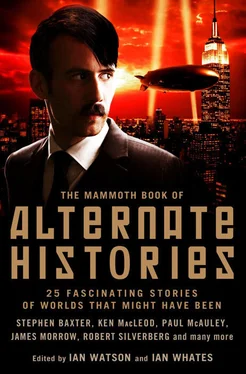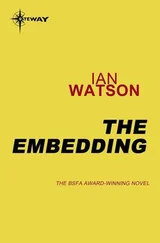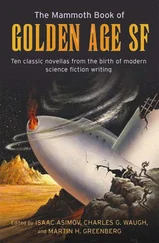Owing to the relentless explosions, the proliferating fires, the rain of bullets, and the general chaos, nearly three hundred sailors — perhaps three dozen from the Carmania, the rest from the Wilhelm — were now in the water, some dead, some wounded, most merely dazed. Fully half the castaways swam for the colliers and lifeboats of their respective nationalities, but the others took a profound and understandable interest in the Ada. And so it happened that our little republic suddenly found itself in need of an immigration policy.
Unlike the Titanic , the Wilhelm did not break in two. She simply lurched crazily to port, then slowly but inexorably disappeared. Throughout the sinking I consulted with the leaders of Parliament, and we soon reached a decision that, ten hours later, I am still willing to call enlightened. We would rescue anyone, British or German, who could climb aboard on his own hook, provided he agreed to renounce his nationality, embrace the founding documents of Adaland, and forswear any notion of bringing the Great War to our waterborne, sovereign, neutral country. As it happened, every sailor to whom we proposed these terms gave his immediate assent, though doubtless many prospective citizens were simply telling us what they knew we wanted to hear.
Being ill-equipped to deal with the severely maimed, we had to leave them to the colliers, even those unfortunates who desperately wanted to join us. I shall not soon forget the bobbing casualties of the Battle of Trindade. Even Major Butt and Colonel Weir had never seen such carnage. A boy — and they were all boys — with his lower jaw blasted away. Another boy with both hands burned off. An English lad whose severed legs floated alongside him like jettisoned oars. A German sailor whose sprung intestines encircled his midriff like some grisly life-preserver. The pen trembles in my hand. I can write no more.
29 October 1914
Lat. 10°35 ‘S, Long. 38° 11’ W
Every day, fair or foul, the Great War chews up and spits out another ten thousand mothers’ sons, sometimes many more. Were the Ada’s scores of able-bodied Englishmen, Irishmen, Welshmen and Scotsmen to sail home now and repatriate themselves, the majority would probably wind up in the trenches. The beast needs feeding. As for those hundreds of young men who boarded the Titanic intending to settle in New York or Boston or perhaps even the Great Plains, they too are vulnerable, since it’s doubtless only a matter of months before President Wilson consigns several million Yanks to the Western Front.
And so it happens that a consensus concerning the present cataclysm has emerged amongst our population. I suspect we would have come to this view even without our experience of naval warfare. In any event, the Great War is not for us. We sincerely hope that the participating nations extract from the slaughter whatever their hearts desire: honour, glory, adventure, relief from ennui. But I think we’ll sit this one out.
Yesterday I held an emergency meeting with my capable Deputy Prime Minister, Mr Futrelle, my level-headed Minister of State, Mr Andrews, and my astute Minister of War, Major Butt. After deciding that the South Atlantic is entirely the wrong place for us to be, we set a north-westerly course, destination Central America. I can’t imagine how we’re going to get through the canal. Mrs Wilde assures me we’ll think of something. Lord, how I adore my wife. In January we’re expecting our first child. This happy phenomenon, I must confess, caught us completely by surprise, as Mrs Wilde is forty-six years old. Evidently our baby was meant to be.
15 November 1914
Lat. 7°10’N, Long. 79°15’W
Mirabile dictu — we’ve done it! Thanks to Mrs Astor’s diamond tiara, Mrs Guggenheim’s ruby necklace, and a dozen other such gewgaws, we managed to bribe, barter and wheedle our way from one side of the Isthmus of Panama to the other. Being a mere 110 feet side to side, the lock chambers barely accommodated our machine, but we nevertheless squeaked through.
The Ada is heading south-southwest, bound for the Galapagos Islands and the rolling blue sea beyond. I haven’t the remotest notion where we might end up, luscious Tahiti perhaps, or historic Pitcairn Island, or Pago Pago, or Samoa, and right now I don’t particularly care. What matters is that we are rid of both the Belle Époque and the darkling plain. Bring on the South Pacific, typhoons and all.
Night falls over the Gulf of Panama. By the gleam of my electric torch I am reading the Oxford Book of English Verse. Three stanzas by George Peele seem relevant to our situation. In the presence of Queen Elizabeth, an ancient warrior doffs his helmet, which “now shall make a hive for bees”. No longer able to fight, he proposes to serve Her Majesty in a different way. “Goddess, allow this aged man his right to be your beadsman now, that was your knight.” The poem is called “Farewell to Arms”, a sentiment to which we Battle of Trindade veterans respond with enthusiastic sympathy, though not for any reasons Mr Peele would recognize. Farewell, ignorant armies. Auf Wiedersehen, dreadful Kronprinz Wilhelm. Adieu, fatuous Good Hope. Hail and farewell.
I am master of a wondrous raft, and soon I shall be a father as well. Over two thousand pilgrims are in my keeping, and at present every soul is safe. Strange stars glitter in a stranger sky. Colonel Astor’s Airedale and Mr Harper’s Pekingese howl at the bright gibbous moon. The sea is calm tonight, and I am a very lucky man.
I bought a kilo of oranges in Soho — Covent Garden would have none at this time of year — and walked down Whitcomb Street and around the corner on Pall Mall to the Square. The Gate faced me, a concrete henge straddling the entrance to Duncannon Street. There wasn’t much of a queue, just a line four abreast filling the pavement along the front of the National Gallery and St Martin’s in the Fields. I passed the two hours it took me to get to the front reading the latest Amis fils in paperback. I turned the last page and chucked the Penguin to a hurrying, threadbare art student seconds before I’d have had to relinquish the book to the security bin.
“Papers, please.”
I resisted the temptation to monkey the guard’s cockney. String bag slung on the thumb, rope of my duffel bag clutched in the fingers of one hand, I passed the documents over with the other, for a frowning moment of scrutiny. Then the guard waved me on to the Customs table. Wanded, searched, duffel bag contents spread out and thrust back in any old how. Passport scanned and stamped. One orange taken “for random inspection”. I’ve paid worse tolls. As long as the stack of Marie Therese thalers and the small change in my boot-heels made it through, I was good to go anywhere.
I walked under the arch and into Scotland.
They don’t like you to call it Scotland, of course. Officially, East London is the capital of the GBR (which — the tired joke notwithstanding — doesn’t actually stand for “Gordon Brown’s Republic” but is the full name of the state, derived from the standard ISO abbreviation for “Great Britain” and accepted as its legal designation at the exhausted end of the 1978 UN Security Council session that imposed the settlement, ending the bloody civil war that followed the Colonels’ Coup of ‘73). But it’s mostly Scottish accents you hear on the streets, along with Asian and African and Islingtonian — the few thousand white working-class Londoners who stayed in the East are in high demand as faces and voices for the regime: actors, diplomats, border guards. North Britain (another name they don’t like) speaks to the world in a cockney accent.
Читать дальше












